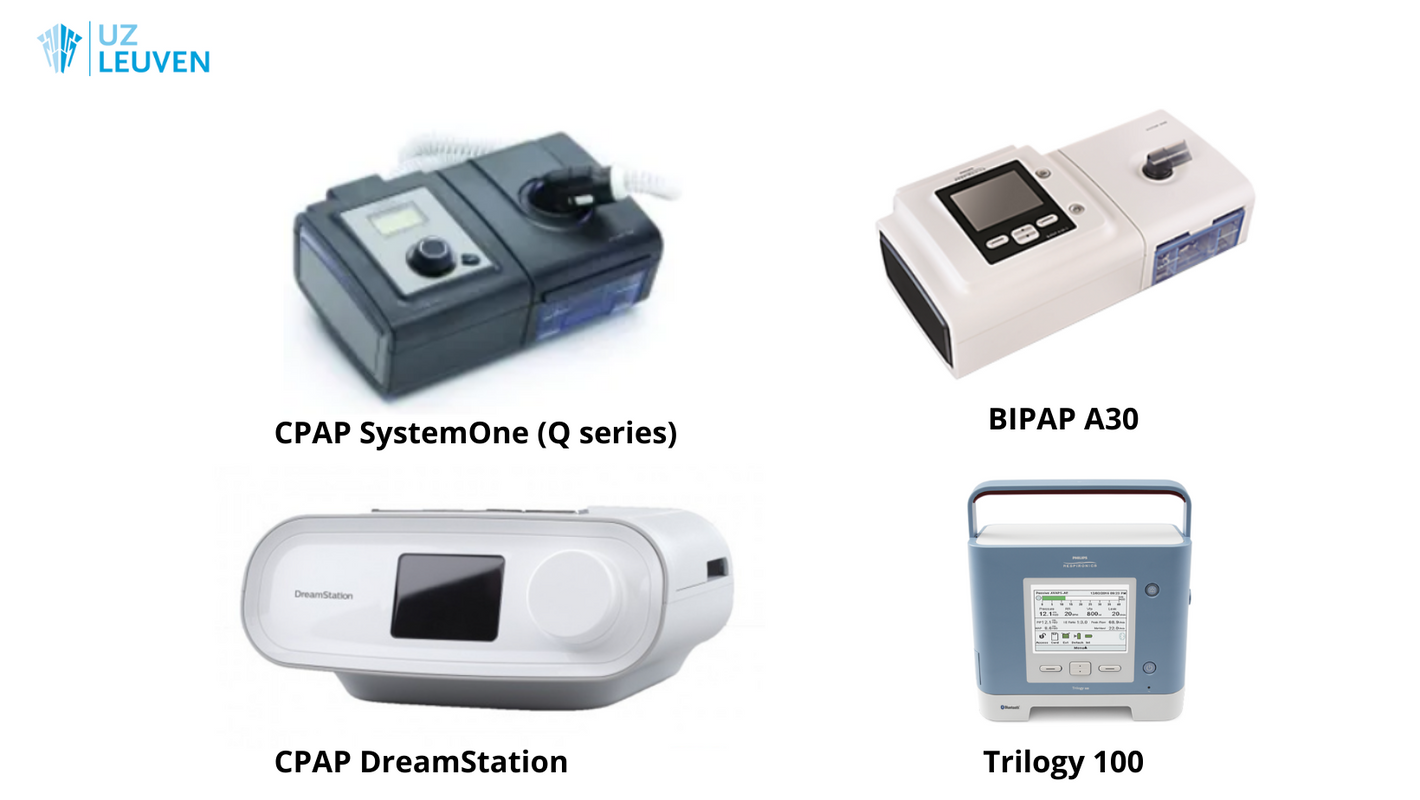Update 6 August 2021
For these devices, UZ Leuven closely follows the recommendations of the FAMHP. According to the data from Philips analysed by the FAMHP, there are no serious acute health risks linked to the use of CPAP devices and ventilators. Nor is there currently any indication of long-term risks.
- The FAMHP found that in the devices causing problems worldwide, the released (foam) particles are too large to be absorbed into the lungs. However, the particles may cause irritation in the upper airways. Factors that may aggravate the problem, such as high ambient temperature, high humidity or the use of ozone-based cleaning agents, are barely relevant in Belgium.
- On the advice of the FAMHP, we strongly advise patients not to stop their treatment. The potential safety risk does not outweigh the health risks of a sudden interruption. Patients with questions about their treatment with the devices should consult their treating physician.
- Together with the FAMHP, UZ Leuven is pressing Philips to conduct further investigations. We also expect clarification from Philips in the coming months regarding the timeframe for replacement or repair of the devices.
Update 22 July 2021
UZ Leuven repeatedly urged the Federal Agency for Medicines and Health Products (FAMHP) to issue general guidance for Belgian hospitals regarding the use of the devices that Philips issued a safety alert for. You can read the FAMHP’s advice here (in Dutch).
What is the problem with the equipment?
There is a chance that the sound-insulating foam in some of these devices may degrade, allowing small particles or gases to be inhaled through the hose and mask. These particles and gases may irritate the airways and could also be carcinogenic. Read more in the press release issued by Philips (in Dutch).
Which devices are concerned?
For patients of the sleep lab at UZ Leuven, the following devices are concerned:
- CPAP SystemOne (Q series)
- CPAP DreamStation
- BIPAP A30
- Trilogy 100

What are the health risks?
Based on the latest information from Philips, it is not yet clear what the exact health risks are for patients. Further investigation is ongoing. We understand this uncertainty may be difficult for our patients, but we are closely monitoring developments on their behalf.
What does this mean for the treatment?
While awaiting further information, we advise patients not to discontinue treatment with this device. We follow the recommendations of the European Respiratory Society (ERS) and the Belgian Association for Sleep research and Sleep medicine (BASS). The potential disadvantages of the devices do not outweigh the benefits of treatment.
What will happen to the devices?
If further information confirms that the use of these devices poses a health risk, they will be repaired and/or replaced by Philips. Philips is currently developing a plan for this together with the suppliers. Our doctors are in contact with the suppliers. As soon as the plan is launched, the devices will be repaired or replaced as quickly as possible. Patients do not need to take any action themselves.
Where can you go for information as a patient?
On this website, we offer an overview of questions and answers concerning the safety alert. If new information becomes available, it will be posted here. You can count on this being a priority for us.
We will contact our patients by phone ourselves as soon as it is clear whether, and what, action needs to be taken.
More information:
In our neighboring countries the Netherlands and France, the government has also issued a medical notice about Philips CPAP machines and ventilators. You can find these notices on the following websites:
- https://www.igj.nl/publicaties/brieven/2021/07/16/aanbeveling-voor-nader-beleid-binnen-nederland-volgend-op-de-veiligheidsmeldingen-van-fabrikant-philips-over-cpap-bipap-en-beademingsapparaten
- https://ansm.sante.fr/actualites/rappel-de-ventilateurs-et-appareils-de-ppc-philips-actualisation-de-la-conduite-a-tenir